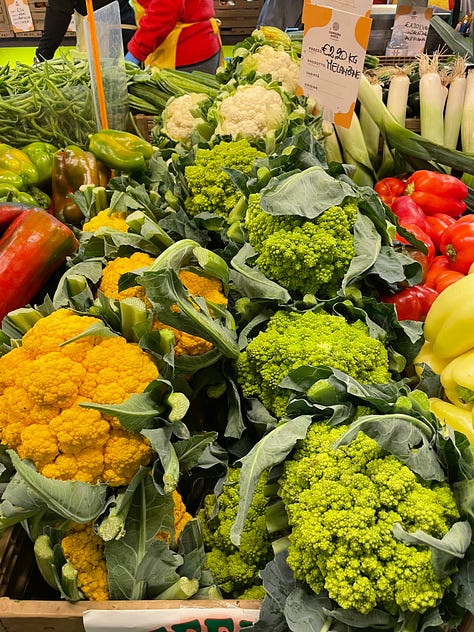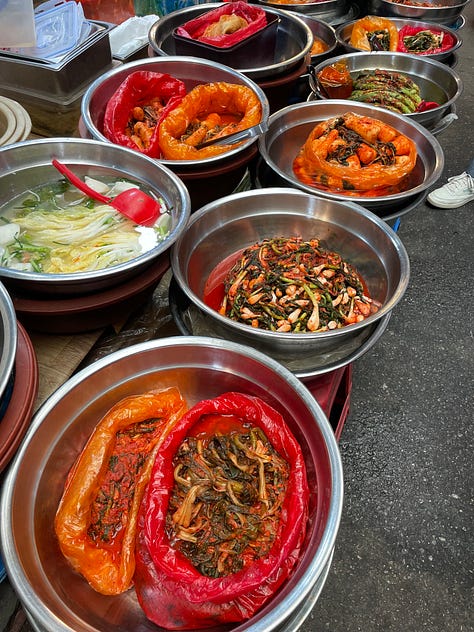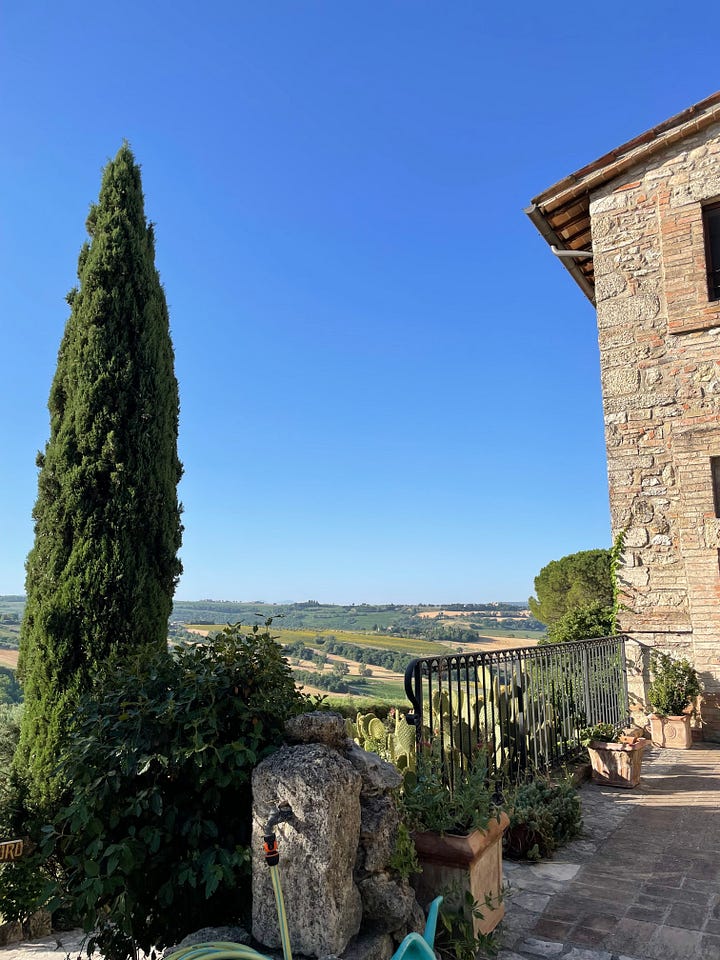When planning a trip, how often does sustainability cross your mind? And when it does, what do you consider? This week, Food People has invited guest writer Michaela to share her take on sustainable travel, with a special focus on our food and drink choices while we’re away. From market visits to local specialties, what does it really mean to eat responsibly on the road? We’d love to hear your thoughts in the comments.
Michaela is an avid traveler and world explorer working for a climate advocacy nonprofit in Washington, DC. She graduated from the Food Studies M.A. program at The American University of Rome and received her B.A. from Georgetown University in Spanish Studies and Government.
Buckle up, and let’s hit the road!
I was born with the travel bug. For as long as I can remember, I’ve had an itch to explore and adventure our big, beautiful world. Growing up in an Italian-American household, I had a small taste—both literally and figuratively—of where my family came from, which sparked a desire to discover my roots through food and travel.
I was raised with the implicit knowledge that good company around the table was a gift, and I carried that value with me as I started to venture outside of my little farm town and into the world around me.
I was sixteen when I spent my first summer abroad in Barcelona. It opened my eyes to a whole new world of food, culture, and art that I had yet to discover, or even imagine existed. I still have fond memories of sitting on my host mom’s patio, surrounded by her jungle of aloe vera and summer vegetables, tasting a cuisine that was so familiar to her, but so innovative to me. I didn’t know it then, but that summer started me on a path to keep moving and exploring. Once you catch the bug, it’s hard to lose it.
Fearful of the boredom that came with staying in one place for too long, I kept looking for new ways to expand my horizons and my taste buds. I dipped my toes into different countries and parts of the world, always with a sense of respect for and awe of the diversity of cuisines that exists around us, and the larger history and culture that inform them. I started to build a global community of travelers, equally seeking to uncover the mystery of new places by way of food.



But as I grew, the realities of travel started to reveal themselves—or maybe, I finally opened my eyes. Memories of meandering through sun-soaked coastal towns or medieval villages across Europe in search of the most “authentic” (Editors’ Note: We need an entire article or more to dive into the nuances of this word… maybe coming soon!) meal are replaced with stark footage of communities drowning in Valencia and Emilia Romagna as they struggle to survive sudden onslaughts of rain. Leisurely afternoons sipping from a coconut on golden beaches in Rio de Janeiro now evoke images of the unbearable heat plaguing Brazilian cities, confining people indoors in attempts to survive. Images of urban playgrounds I keenly explored in search of the next sweet treat from street vendors are now distorted by hazy, polluted skies from rising emissions to meet an incessant demand for consumption. I now find myself asking: Are my travels part of the problem?
Food can build bridges between cultures, but even the best-intended explorers can contribute to destroying the places that locals frequent daily. The more I dive into climate and sustainability work, the more I see the threats of the climate crisis everywhere I go and in everything I do. Each flight I take adds fuel to the fires raging over agricultural lands and into cities across Canada, California, Brazil, and Sicily… the list goes on. Every time I cave to my desires to explore, I’m contributing to the emissions footprint of a city that I’ll soon depart, leaving its inhabitants to deal with the damaging impacts of my adventures. Each new trendy eatery takes dollars from smaller, local spots trying to compete with the crowds that only social media-famous locales can attract. And an influx of tourists often prices out locals who equally want to enjoy the food culture of their own cities.
Governments worldwide are reacting to the threats of overtourism through fiscal measures to preserve and restore the environmental, economic, and social sustainability of their communities. Notably overrun cities, like Venice, Paris, and Amsterdam have instituted a tourist tax, and some, like Athens and Lisbon, have capped the number of visitors allowed entry to highly popular sites. As industries grow to benefit the traveler, locals have started to protest corporate tourism giants for the harm they pose to communities.
The selfish part of me wants to blame these problems on a broken system. In part, that’s true. We are a society built on consumption, and my individual choices won’t change that overnight. I often ask myself: How can food travel, something that brings so much joy, builds appreciation for difference, and creates community and exchange in some of the most beautiful ways, really be the cause of harm?
I then step back to consider each individual's role in building the system that is destroying our planet. I’m realizing that means we all must take a hard look at how our choices are part of the problem. Are travel, food, and sustainability really that incompatible? Are my attempts to learn just extractive? How do I justify my own work in the climate movement if I continue to fuel this problem?
I keep returning to the belief that a genuine desire to understand the world isn’t inherently a bad thing. Travel and sustainability can coexist, but it may require us to rethink norms and make some compromises. Sometimes the best intentions don’t match our impacts, and the solutions the tourism industry feeds us, like buying a carbon offset for each flight we take, are often insufficient at best, and pure greenwashing at worst.
I don’t have a magic answer for how to make travel a truly sustainable practice. But here are some ideas I’m considering as I try to travel more sustainably:
Travel slower | Slow Travel is a philosophy that encourages more intentional forms of tourism. Instead of trying to hit every trending spot in a city, aim to discover what makes a restaurant unique by seeking more local, smaller-scale, but arguably more fulfilling, food experiences—even if they don’t make Top 10 lists.
Wander off the beaten path | Some cities have gained international renown (and for good reason), but the impact of overtourism can be devastating to local economies and environments. Instead of visiting or revisiting the same destination, opt for a rural getaway, such as at an agriturismo if you’re in Italy, to experience local food from its source and meet the farmers who keep these hot spots running.
Support local economies | Consider how your travels can financially benefit (or harm) the local economy. Instead of relying on global name-brands or the most popular restaurant to join in on the hype, look for smaller, boutique options to support small businesses and reinvest in the community.


Travel can be truly eye-opening: It can help build community around a table, strengthen economies by supporting local producers, and increase our tolerance for discomfort and difference by sampling the unfamiliar—in an era when these things are more important than ever. But it can also be extractive and damaging both to the communities we visit and the natural world around us. Truly sustainable travel involves respecting the processes and people that make the food culture a reality in each destination. That means diving deeper than the most popular spots promoted online and putting a name and face to where a famed dish, or even its individual ingredients, may come from.
I’ll be the first to admit that I am far from being a perfectly sustainable traveler and haven’t yet found the key to balancing my love for the planet and my desire to explore all it has to offer. However, I see an opportunity to rethink how we travel, putting local farmers, producers, and shop owners front and center. It’s my mission to start traveling more sustainably in 2025. I hope I’ll see you on the way.






Another point to think about is how we share our experiences. Are we adding to the hype by posting “quick” Instagram/social media photos, or do we resist the urge to reveal every detail of our travels online? This is something I have been thinking about more during/after a travel experience.